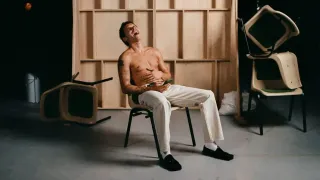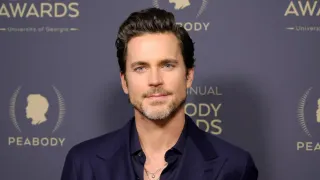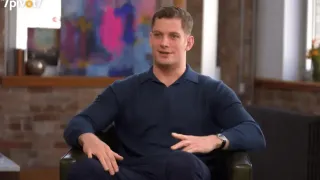February 17, 2015
Fascinating People :: Rebecca Cantrell
Kilian Melloy READ TIME: 10 MIN.
So far in the Fascinating People series of columns, I've chatted with men. Now, I like men, but there are some fascinating women out there, too, such as mystery writer Rebecca Cantrell, who -- yay! -- is this week's interviewee.
Cantrell is the prolific writer behind three series of novels: The Hannah Vogel mysteries, which follow the historically-set adventures of a German female newspaper reporter as she repeatedly tangles with Nazis in 1930s Berlin; a trio of novels (or, depending how you look at it, a quintet of novels), co-written with James Rollins, collectively titled "The Order of the Sanguines," chronicling a war between two cadres of vampires; and the Joe Tesla mysteries, centered around the adventures of a billionaire software entrepreneur, the grandson of legendary electrical pioneer Nikola Tesla. Joe Tesla's exploits have a twist, in that he suffers from crippling agoraphobia and can only range freely underground, through New York's extensive subway and steam tunnel system.
The idea behind these columns is to chat with fascinating people regardless of whether they have a new book or movie or other project, but the timing of Cantrell's new novel -- Book Two in the series, titled "The Tesla Legacy" -- was so propitious that the prospect of an interview about the newly published title, and Cantrell's oeuvre overall, was irresistible.
In "The Tesla Legacy," Joe is mourning the death of his father, a brilliant mathematician who, decades earlier, had secretly tracked down a dangerous invention of Nikola Tesla's -- a small device that, despite its tiny size, possesses enough destructive power to bring down skyscrapers. The very idea of a hitherto-unknown Tesla device is intriguing enough, but for a fellow named Ash -- a megalomaniac and eco-defender who is Joe's equal in brainpower and financial means, but who is unfettered by moral concerns and perfectly willing to sacrifice human lives to get what he wants -- it's what the device is capable of that makes it worth possessing. Ash intends to use the device to destroy (quite literally) a powerful family called the Breakers, who run roughshod over the environment in their pursuit of power and wealth.
In a parallel plot thread, Joe Tesla realizes that the NSA has been using the software he developed -- a key product that's brought in the bulk of his cast fortune -- to track the movements of ordinary people. The book crackles with the tension of opposing forces, from the equal-but-opposite dynamic that defines Joe and Ash as countervailing personae to thorny legal and ethical issues centered around surveillance and security, to the emerging question of America's oligarchy, its corrosive influence on democratic ideals, and the problem of what, exactly, ordinary people might do about it.
"The Tesla Legacy" wraps all of those intellectually engaging thematic elements into an action-adventure plot, setting Joe and Ash on a collision course while a cast of supporting characters rounds things out: Joe's personal security expert, Vivian Torres, his smart service dog, Edison, and his mother, Tatiana, a former trapeze artist, not to mention free agents and loose cannons like "Geezer" and "Quantum," associates of Ash who work with him until and unless they work against him. Cantrell's novels have characteristically been tightly plotted and fast paced, but with "The Tesla Legacy" the novelist has upped her game -- and she pulls the reader right to the brink.
Good readers, the fascinating Rebecca Cantrell.
EDGE: Now that you have branched out from the Hannah Vogel series, are you finding you have new ideas for still more ongoing series of novels with different settings and characters?
Rebecca Cantrell: Yes, tons. I've been having a wonderful time writing whatever I'm passionate about. I loved the Hannah Vogel novels and the research I did into life in 1930s Berlin. I loved the Order of the Sanguines trilogy that I wrote with James Rollins because it gave me a chance to think about the supernatural and its role in history. With the Joe Tesla series, I've had fun researching the science of germ warfare and cybersecurity and the tunnels under New York City. I try to take my readers with me on these fascinating journeys, and I hope that no two are ever alike. And there's this new series I'm thinking about, and a few standalones as well. So many ideas, so little time.
EDGE: Your new series featuring Joe Tesla (fictional grandson of Nikola Tesla) is set in the present, unlike the Hannah Vogel series. How does that change the kind of research you do, the plotting you work out, the kinds of stories you can tell and characters you can put into your novels?
Rebecca Cantrell: The research is a lot easier to come by. I can find urban explorers wandering around in Joe Tesla's tunnels on YouTube. I often find headlines that inspire me to look into cybersecurity (how to hack a car, how to hack a cell phone, etc.). There is a lot more primary source material out there, and I actually know how many things function in the present day world so I don't have to look so much up. That makes world-building go faster.
My plotting process is the same for both series, but with the Joe Tesla series I'm constrained by what's possible today, just as I'm constrained by the world of the 1930s for the Hannah books. I want my fictional world to be as real as I can make it, no matter when or where it's set. Still, I'm pushing the boundaries because the Tesla books are thrillers and need to have certain stakes and pacing.
As for characters, I just work hard to create the most interesting ones I can, regardless of the setting. People in modern New York City have very different problems, constraints, and ways of being in the world than those in Germany during the Third Reich. Everyone and everything is a slave to point of view-who, when, where, and how they exist at a certain moment in history.
EDGE: I'll be it's nice to work on books set in the information age, and feature a software genius, because you get to use your other skill set -- that of software engineer!
Rebecca Cantrell: I wasn't actually a software engineer; I was a technical writer. But I did work in Silicon Valley for years with software engineers, so it's a world I'm much more familiar with than, say, 1930s Berlin or 1500s Venice. I had a lot of fun in that world and met many fascinating characters in the high tech world.
EDGE: With this second book in the Joe Tesla series, it feels like every element has higher stakes -- the first book was fun and exciting, but with this book you've upped the game in terms of plot, excitement, and sheer literary pleasure. One huge element is the addition of Ash, an entrepreneur who is something of a dark mirror version of Joe -- smart, driven, successful, and so focused on his goals to the point of amorality. I found myself thinking of him as Joe's Moriarty. Was that the intention?
Rebecca Cantrell: That's so funny! My husband calls that particular character Moriarty, too! For The Tesla Legacy, I wanted to create a character who was Joe's equal. I've often heard that a story is only as strong as its villain, and I think there's truth to that. I went through a few different antagonists at the rough draft stage, until I realized that it would be most interesting see Joe confronting someone like himself. He'd been placed against bigger adversaries in the first book, characters who were stronger in terms of ruthlessness and the size of the agencies backing them, but I wanted him to go up against an individual that was his personal equal intellectually and financially, maybe even stronger than him.
EDGE: One factor in the new book's thrill factor was that it has echoes of 9/11. Were you consciously adding those factors in? Did you feel a need to be careful, or worry that it's "too early" for fiction to tackle some action elements that might resemble the events of that day?
Rebecca Cantrell: I did worry that the history of 9/11 would call forth a particular kind of response to those scenes at the climax, but I decided to include those scenes because they hark back to the predictions of Nikola Tesla and pre-date 9/11. I tried to handle the scenes as best I could.
EDGE: What's with all the pigeons in "The Tesla Legacy?" They are everywhere. Is there a subtext about freedom? About atavistic family identity? Or is this just a matter of A Whole Lotta Pigeon Goin' On?
Rebecca Cantrell: The pigeons do play a symbolic role in the story. The white pigeon was an object of love for Nikola Tesla, based on his own quotes. For Joe, pigeons also stand for the wild in urban spaces that he glimpses so rarely, and that he tries to set free from the confines of man's creations, even if he can't free himself.
EDGE: Another very topical element of the new book is the question of how the NSA (and, I'm sure, other governmental agencies and, for all we know, private interest also) spy on us -- literally all of us, literally all of the time. I felt like you must have been having imaginary conversations with Edward Snowden as you put Joe Tesla into a position of having to worry that his own software was being abused in ways that put ordinary people in the crosshairs of institutional spying.
Rebecca Cantrell: I've been concerned about privacy for a long time. I worked for a data mining company in the 1990s and was surprised by the conclusions that are drawn from things as simple as a Safeway Club Card. Later, I worked for a telecommunications company that specialized in location information (where your phone says you are). Both of those experiences made me realize how information about our most basic activities is being collected, tracked, and analyzed, but even with that experience I was still shocked by Edward Snowden's revelations.
When Edward Snowden showed the breathtaking extent of online surveillance, Joe Tesla would have been horrified. Growing up in a circus, his childhood was spent on the fringes of the system. He would have been surrounded by those who had a skeptical view of law and order and surveillance.
I spent a lot of time figuring out how Joe would react when he discovered that the facial recognition software he created for matching up faces to known criminals was also being used to track the activities of millions of people never suspected of anything. He had, naively I admit, never realized the potential scope of his product. He was off not just by thousands that were having their privacies unknowingly violated, but by millions, and that is something he grapples with in The Tesla Legacy.
EDGE: You know, it's funny that when you were writing about Hannah Vogel's adventures in Berlin, you were living in Hawaii. Now you live in Berlin, and you're writing about someone who literally lives in New York City's underground. What would you do if a move to the Big Apple were in your future?
Rebecca Cantrell: I'd immediately start a new series set thousands of miles away! Because why make it easy on myself?
Actually, I like to think that I would spend more time in Joe's haunts and write at least a few more books there. I was in New York City last summer for Thrillerfest, and I spent every spare moment in Grand Central Terminal. I drove my friends nuts. Where do you want to have lunch? The Grand Central Food Court! Cocktails? The Campbell Apartment! Dinner? Pershing Square (which is right across the street). They did manage to drag me further afield, but I really loved being able to walk in Joe's footsteps.
EDGE: You must have a ball studying maps of New York and figuring out where to take Joe next!
Rebecca Cantrell: Oh yes! I love looking at old maps and movies and walking around the city deciding where Joe will go underground, and where his bodyguard Vivian will go in the world above.
EDGE: "The Tesla Legacy" also gives us some back story on Joe's family history - and challenges some assumptions we might have held about that history. Did you have that back story worked out before this novel, or was writing "The Tesla Legacy" a process of discovery that led you to these fascinating new parts of Joe's background?
Rebecca Cantrell: I set down a lot of his backstory before I started writing the first Joe Tesla book, "The World Beneath," but I still found some surprises as I was writing The Tesla Legacy. It's one thing to know a detail, such as he grew up in a the circus and his mother was a trapeze artist, and another to spend time with him and his mother in their trailer traveling around the US. Whenever I write a scene, unexpected things emerge.
EDGE: As part of that family background, you introduce us to Joe's mother in this book -- she's classy and capable, and I can't wait to see more of her! Will Joe's mother become a recurring character?
Rebecca Cantrell: I imagine Tatiana Tesla will do whatever she wants. If she wants to be a recurring character, I'm sure she will walk gracefully onto the page and force me to do her bidding. I love her old-fashioned and tough persona, and I will definitely be spending more time with her in future books.
EDGE: Is Joe an easier character to follow into adventures? Does he "talk" to you in a different way from Hannah Vogel?
Rebecca Cantrell: I'm not sure that I would call Joe easy to follow. He has his own quirks and restrictions, the same as Hannah, but I am having a great deal of fun with him. His voice is very different than Hannah's. All of my characters have very specific voices, and I can tell immediately when a sentence comes who would say it.
EDGE: What sorts of adventures are you preparing for Joe, Edison, et al, over the next few books... or is it too early to say?
Rebecca Cantrell: I'm hard at work on Book Three, tentatively titled "The Hunter Below." Joe will be facing a killer who has been murdering women in the subway tunnels for years and targets Joe as his next victim. In "The Hunter Below," Joe will find out who poisoned him and gave him his agoraphobia, although I won't tell you who, why, and what the results will be. His Moriarty, Ash, will be there in the background, and I think he and Joe will be squaring off in the later books.
"The Telsa Legacy" is available now for $14.99 from CreateSpace Independent Publishing Platform






